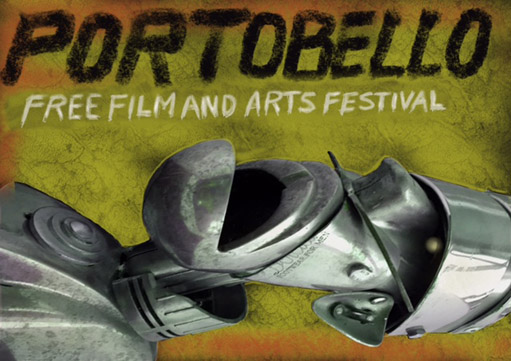Portobello
Film Festival.
Established 1996.


Festival Reports
The Film Festival was created in 1996 as a reaction to
the moribund state of the British film industry, to provide
a forum for new film-makers and give exposure to movies
on different formats. Many of our previously out-on-a-limb
directors have since been recognised by the big fish in
the industry. The festival has been dubbed ‘the
wild side of Brit Film’ (Metro), ‘this pioneering
film festival’ (Evening Standard), ‘the biggest
celebration of independent film in Europe’ (The
Independent) and ‘London’s biggest filmic
free-for-all’ (Time Out). That the Portobello Film
Festival shows tomorrow’s films today is evident
in the number of ideas first presented here that regularly
crop up in the mainstream.
At the start Portobello lacked a cinema – The Electric
didn’t reopen till 2001 and anyway we have never
charged admission, which makes screening in commercial
cinemas problematic - so through virtue out of necessity,
the Festival has screened films in diverse venues like
parks, theatres, clubs and bars.
In 1996 we showed films in two tents on Athlone Gardens
with 35mm and video projection. The selection included
local movies "Performance" by Nicholas Roeg/Donald
Cammell and "Leo The Last" (John Boorman) plus,
in the indie section, the yet to be recognised Guy Ritchie
("The Hard Case") was short listed for the Golden
Boot Award. Other shortlisted films that year included
Gaz Mayall’s “The Great British Spliff”,
Steven Galvin’s “The Hole”, Ritchie
Winearl’s “The Imitators”, Christine
Edzard’s “As You Like It” with James
Fox and Deborah Ferguson’s “Attitude Adjustor”.
The eventual winner…a Golden Boot sponsored by Dr
Martens footwear, and held at a special ceremony at De
Lane Lea Studios in Soho was Caspar Walsh for “Stairway”.
1997: the Festival created a vibe in Athlone Gardens again
with a bar, restaurant and three cinema tents. More audio-visual
style-shapers were screened. Hexstatic showed their stunning
“Natural Rhythm Trilogy” along with Giles
(Orbital) Thacker’s image wizardry. Bill Drummond
came along to the 3-day event to see the K Foundation’s
burning a million quid and 25 hours of the M25 films.
Phil Smith presented the only public showing of his Metalhedz/Blue
Note documentary. By now we were attracting well over
200 entries, from a public appeal in Time Out, colleges,
bars and production houses. The Festival has always been
committed to showing all films submitted and providing
free entry to all screenings. The Golden Boot was awarded
to "Junk", starring Adam Ant, by Cassius Rayner.
In 1998 the festival turned the notorious night club Subterania
into 3 cinemas. Don Lett’s "Punk Rock Movie"
was screened as was his "Audiovisual Bashment"
(previously only shown at the ICA) in the Tabernacle.
The Festival also combined the prose talents of writers
with the artistry of VJ’s, including authors Courttia
Newland, Nicholas Blincoe and Tania Glyde. Poets, Selina
Saliva and Jock Scott also beat out their words to images.
Shane Meadows of "twentyfourseven" fame showed
early VHSs with his grit and wit clearly showing in its
raw form. The Golden Boot was won by Marie Paschou’s
"Un Jour" a moody handmade animation from France.
The technical quality of films has progressively got better
over the years as has the quantity of films submitted.
The Festival has also expanded abroad, screening films
at Cannes, Macau and Venice in 2000. The Festival is a
real living film festival. Films at Cannes and Edinburgh
are regularly screened first at the Portobello Film Festival.
Audiences, too, have constantly increased over the years
from 1,000 the first year to over 15,000 now. The fourth
Festival, on Portobello Green inh 1999, hosted local films,
kids films from the BBC Community Films Unit, documentaries
and features. This was the first year with a Megasceen
for daytime viewing. "Lock Stock and Two Smoking
Barrels" and "City of Lost Children" were
great hits in the evening. Other venues included the new
Belgo Zuid on Ladbroke Grove and Subterania again. The
Golden Boot was won by Andy Shelley for "Grandpa".
2000 wasthe biggest event by far to date. The Festival
was hosted in a diverse range of venues from the luxury
of Screen West to the nightclub ambience of Subterania,
from the informal Video Café at the Beat Bar in
Portobello Road to the outdoor Megascreen and the Big
Top multiplex in Emslie Hornimans Park. We received over
300 brand new independent shorts and features. The total
screening time was 144 hours shown over two weeks. The
winner of a JVC camcorder for Best Direction on Video,
"The Real Notting Hill", was picked up by Channel
Four. Courtney Love came to see Pam Hogg’s film
with Primal Scream, "Accelerator". The Festival
included a music day with films about Bob Marley ("One
Love"), The Clash ("Westway To The World")
and The Sex Pistols ("The Filth And The Fury")
that drew in vast crowds. Best Movie went to “Observations
In Holland”.
We had an International Section of very high quality films
from around the world submitted via our website www.portobellofilmfestival.com
.
In 2001 the Festival continued to expand with screenings
at Subterannia, Uncles, Emslie Hornimans Park, The Chilled
Eskimo, Screen West and The Electric Cinema. We screened
Lars Von Triers “The Kingdom”, “O Brother
Where Art Thou” when the megascreen was attacked
by an outraged local who thought the Klu Klux Klan section
was racist (he did not stay to watch the end of the sequence),
“The Cup” a wonderful Tibetan film about an
apprentice Buddhist monk who wants to watch the World
Cup, the world premiere of “One Giant Leap”,
and Roger Pomphrey’s “Life, Death, And Damian
Hirst”. The winning movie was “Flipside”
by Richard Van Der Berg about a bad trip at a posh party.
For full details of Festivals 1998 – 2005 please
click on date buttons at top of page.
|





